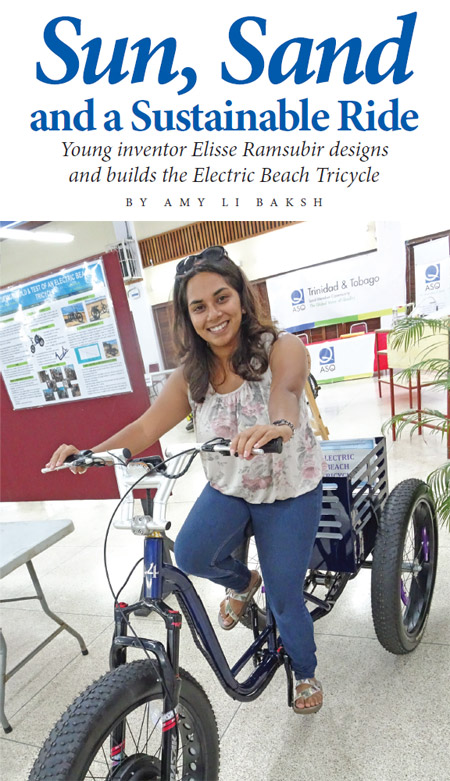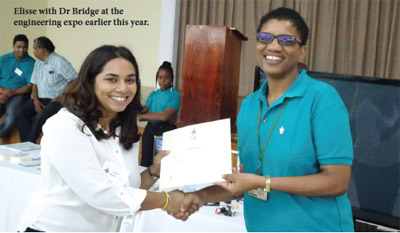 |
 |
 |
|
September 2019
|
Elisse recently graduated from the Department of Mechanical and Manufacturing Engineering (DMME), and for her final year project she wanted to build something she could use at her favourite spot on the island. “The beach is my favourite place to be. Mayaro especially is close to my heart, because growing up I spent a lot of time there with my family.” And so Mayaro became the perfect spot to test out her very first Electric Beach Tricycle, or E-Trike. As an avid beach-goer, Elisse also feels a sense of responsibility for its environment. According to Head of the DMME, Dr Jacqueline Bridge, “She was concerned about the fact that there were people on the beaches using gasoline powered buggies… she felt it would be a nice idea to explore electric vehicles. They don't make too much noise, and they have no emissions during operation.” “I wanted a safer alternative to all-terrain vehicles (ATVs) and cars on the shore,” says Elisse. While people are becoming more aware of turtle nesting areas and other ecological concerns, there is still far to go to coexist sustainably with the life on our coasts. “Not many people respect the safety of the wildlife on the beach, or even safety of other beachgoers. ATVs can weigh between 300-700 pounds, while the E-Trike weighs 70 pounds—so the damage that can be caused is significantly less. ATVs and cars also contribute to pollution.” As our beaches get busier, air and noise pollution can affect the environment, the wildlife, and even other beachgoers. Now more than ever, people like Elisse are looking into greener ways to live in harmony with the world around us. “In Mechanical Engineering, we’re looking at alternative methods,” says Dr Bridge, “There's a move away from gasoline and emission-based transportation to cleaner forms of transportation.” So instead of filling up at a gas station, you just plug into the nearest outlet and charge up the lithium ion battery before pedaling on your way. With Elisse’s E-Trike, one full battery gets you 3-6 hours, depending on your speed. After researching and designing for 6 months, Elisse put together the E-Trike in two hectic weeks. “It assists the rider on rough terrains with minimum human effort. We tried to ensure maximum comfort and maximum performance on the beach especially,” she says. At every stage, Elisse tried to consider the needs of the rider, creating a design that would allow riders with low mobility, like the elderly or disabled persons, to use and adjust the E-Trike with ease. "I like that mechanical engineers design things that make people's lives easier,” she says. “That's why I decided on that type of engineering to study.”
While there are many functional or commercial uses for Elisse’s design, recreation was where she hoped to put it to use first. For Elisse, recreation is best had doing something hands-on; or as she put it, “getting my hands dirty”. Growing up, this was always a trait of hers, and one her parents nurtured into the love of building things that she has today. Although she has not taken it back to Mayaro Beach since her test run, the E-Trike and Elisse have been cruising around her home and streets across T&T. “Even if you're not on the beach, it still works well. It could be used on the road too,” she says. With any luck, you might spot her on a terrain near you. Amy Li Baksh is a Trinidadian writer, artist and activist who makes art to uplift and amplify the unheard voices in our society. |

 On a typical beach day in Mayaro, you’ll come across stretches of sand, coconut trees, maybe some washed up jellyfish—and if you’re lucky, you might catch Elisse Ramsubir cruising down the shore on the electric tricycle she designed and built herself.
On a typical beach day in Mayaro, you’ll come across stretches of sand, coconut trees, maybe some washed up jellyfish—and if you’re lucky, you might catch Elisse Ramsubir cruising down the shore on the electric tricycle she designed and built herself. The three-wheeler earned Elisse first place at the DMME’s Conference and Exhibition in May of this year. But building her first Electric Trike is only the beginning for Elisse. “I would like to commercialise it, make more, change up the design a little bit and introduce it to tourist-y areas like hotels or even on campus,” she says. But first and foremost, she had one thing in mind when she started up this project— she wanted to have fun. With a laugh, she confesses, “I knew I wanted to make something I could play with after!”
The three-wheeler earned Elisse first place at the DMME’s Conference and Exhibition in May of this year. But building her first Electric Trike is only the beginning for Elisse. “I would like to commercialise it, make more, change up the design a little bit and introduce it to tourist-y areas like hotels or even on campus,” she says. But first and foremost, she had one thing in mind when she started up this project— she wanted to have fun. With a laugh, she confesses, “I knew I wanted to make something I could play with after!”